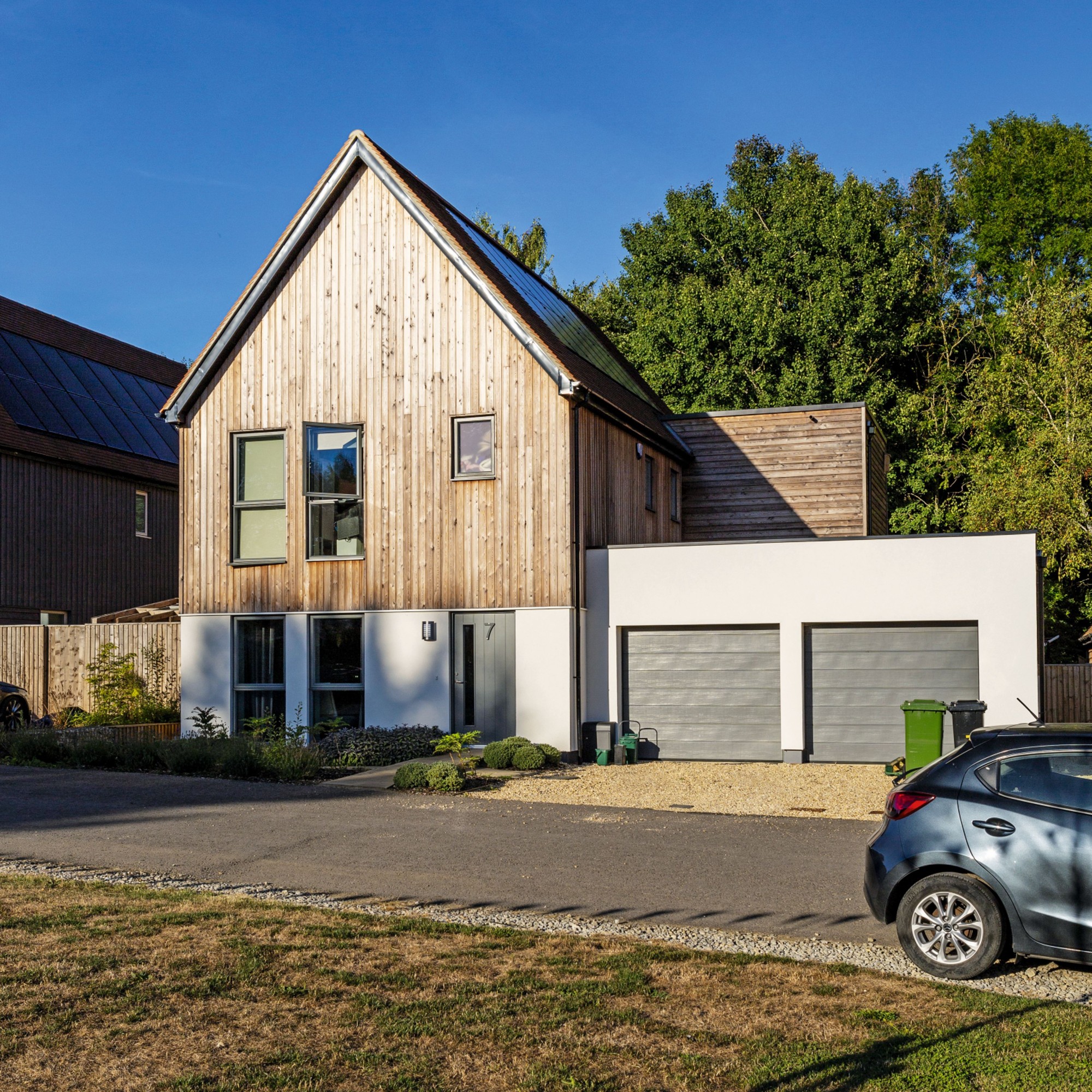Is a 40-year mortgage a good idea? Our money expert explains
A 40-year mortgage could be the key to lower monthly repayments, but is it an option worth considering?

For first-time buyers trying to get on the property ladder, a 40-year mortgage term may seem like the best option to keep monthly repayments as low as possible.
But is it a good idea? The decision to extend a mortgage more than a decade beyond the traditional 25-year-term is one of necessity rather than choice.
The average house price stands at around £260,000, according to Nationwide, up from almost £170,000 ten years ago, a rise of 53%. To afford such a huge uplift in price, borrowers in England can expect to spend 8.3 times their full-time annual earnings, figures from the Office for National Statistics show.
Coupled with the volatility of mortgage rates since October 2022 and more recent rises, it’s no wonder that first-time buyers taking a mortgage with a term of 35 years or more rose from 8% to 18% between February 2022 and 2023.

Are 40-year mortgages a good idea?
Whether or not a 40-year mortgage is a good idea depends on your individual financial circumstances.
Adrian Anderson, director of mortgage broker Anderson Harris said: ‘Everyone is seeing a rise in the cost of their outgoings across all areas of their lives and interest rates have increased. Those who are looking to buy are trying to reduce their monthly costs as much as possible. One way to do that is by having the maximum possible mortgage term.’
For some buyers, a 40-year mortgage may be their only ticket to homeownership. Stretching the mortgage term lowers the monthly payment and makes it easier to pass the lender’s affordability test.
Get the Ideal Home Newsletter
Sign up to our newsletter for style and decor inspiration, house makeovers, project advice and more.

Who is a 40-year mortgage suitable for?
Young borrowers in their late twenties or early to mid-thirties are best suited to a 40-year mortgage because they are more likely to be employed throughout the life of the mortgage.
David Hollingworth of broker L&C Mortgages said: 'Not everyone’s eligible. There’s a natural cap and that’s down to banks’ lending criteria. A lender looks at the borrower’s affordability not just now, but throughout the life of the mortgage. If the mortgage term takes you past retirement, the bank needs to know how you’ll pay the loan when you’re not working. The lender also has a maximum age restriction at the end of the mortgage term, beyond which it won’t lend.'
The good news for first-time buyers is that almost 90% of lenders have a maximum age of 71 or more and 65% of all mortgage deals have a 40-year term according to Moneyfacts.
Here's a snapshot of lenders’ maximum ages and terms (if your retirement income meets their affordability rules):
| Lender | Maximum age | Maximum term (years) |
|---|---|---|
| Halifax | 80 | 40 |
| Barclays | 70 (exceptions considered) | 40 |
| Nationwide | 75 | 40 |
| HSBC | 80 | 35 |
| NatWest | 75 | 40 |
| Santander | 75 | 40 |
Reasons to get a 40-year mortgage
There’s only one benefit to a 40-year mortgage and that’s lower monthly payments.
David Hollingworth says: “Buyers taking on homeownership for the first time may want some breathing space in their budget. First-time buyers are likely to be stretching themselves in the first place, a 40-year mortgage term can help to make things more affordable in those early years.”
Borrowers with a £150,000 mortgage on a rate of 4.5% will pay monthly:
- £833.75 over 25 years
- £760.03 over 30 years
- £709.89 over 35 years
- £674.34 over 40 years
Source: L&C Mortgages
By stretching the term from 25 years to 40 years you can lower your monthly payment by almost £160 a month.

Drawbacks of a 40-year mortgage
The longer you take to repay your mortgage, the more interest you’ll pay back. Using the example above, by stretching your term from 25 years to 40 years you will pay back £73,558 more in interest over the life of the mortgage.
David Hollingworth adds: 'Stretching the term comes at a cost because you’re eroding the debt more slowly and paying interest for a lot longer. When borrowers are ready to remortgage in the future, they should review the term and trim it back as much as possible.'

What are the alternatives?
One alternative is to choose a lower term. You don’t have to jump from 30 to 40 years if a term of 34 years is sufficient.
Or, take a 40-year term and contact your lender after your mortgage has completed to up your direct debit to a level that helps you to pay back the loan sooner. If that becomes a struggle, drop it back to your contractual monthly payment.
Taking a mortgage on an interest-only basis is another way to lower your monthly payments. But this option is reserved for those with a deposit of at least 25% of the purchase price, the maximum term is restricted to 25 years and the maximum age is also lower. Borrowers must have a plan in place to repay the mortgage at the end of term.
Check out our guide if you're looking for the best first-time buyer mortgage deals.
Samantha Partington is a personal finance journalist specialising in mortgages and the property market.
Over the past nine years, Samantha has worked for the Daily Mail, trade website Mortgage Solutions and business title Property Week. She regularly writes for national money pages including Money Mail and Sun Money and supports prop tech firms with content writing.
-
 Are conservatories going to be banned in the UK?
Are conservatories going to be banned in the UK?Conservatory pros reveal the truth behind the rumours
By Rebecca Foster
-
 The herbs you should plant together for an easy-care herb garden – 6 expert-recommended combinations
The herbs you should plant together for an easy-care herb garden – 6 expert-recommended combinationsMake this year's herb garden effortless
By Sophie King
-
 IKEA has drenched its BILLY bookcase in this year’s ‘it’ colour - but you’ll have to act fast if you want to get your hands on one
IKEA has drenched its BILLY bookcase in this year’s ‘it’ colour - but you’ll have to act fast if you want to get your hands on oneI'm obsessed with this gorgeous limited-edition colourway
By Kezia Reynolds
-
 You can claim back over £300 a year from HMRC if you work from home - here’s how to check if you’re eligible
You can claim back over £300 a year from HMRC if you work from home - here’s how to check if you’re eligibleWhen it comes to saving, every little helps
By Kezia Reynolds
-
 Experts have revealed the best day to renew your home insurance policy - you’ll want to do it sooner rather than later
Experts have revealed the best day to renew your home insurance policy - you’ll want to do it sooner rather than laterDon't leave this task at the bottom of your to do list
By Kezia Reynolds
-
 Is a variable rate mortgage ever a good idea? Experts weigh in
Is a variable rate mortgage ever a good idea? Experts weigh inOur money expert explains what a variable rate mortgage is, who they can be good for, and the pros and cons of this kind of mortgage
By Samantha Partington
-
 I’m a first-time buyer, what are my chances of getting a mortgage right now?
I’m a first-time buyer, what are my chances of getting a mortgage right now?And what you can do to increase your odds
By Rachel Wait
-
 Should you ever pay above the asking price for a home?
Should you ever pay above the asking price for a home?Our money expert explains whether you should ever pay over the asking price for a home, especially if house prices fall as predicted
By Samantha Partington
-
 Should I fix my mortgage and how long should I fix for?
Should I fix my mortgage and how long should I fix for?We speak to the experts to find out whether you should fix your mortgage and how long for as well as the impact further interest changes could have on your decision
By Samantha Partington
-
 We put your mortgage questions to two leading experts, here's what they said
We put your mortgage questions to two leading experts, here's what they saidAs mortgage panic continues, we've answered the most common questions - from when mortgage rates will come down, to when you actually have to pay stamp duty
By Samantha Partington
-
 'My mortgage is set to skyrocket - what should I do?' 5 potential solutions from a money expert
'My mortgage is set to skyrocket - what should I do?' 5 potential solutions from a money expertIf you're facing higher mortgage costs, our money expert explains various courses of action you could take to ease the pressure
By Samantha Partington